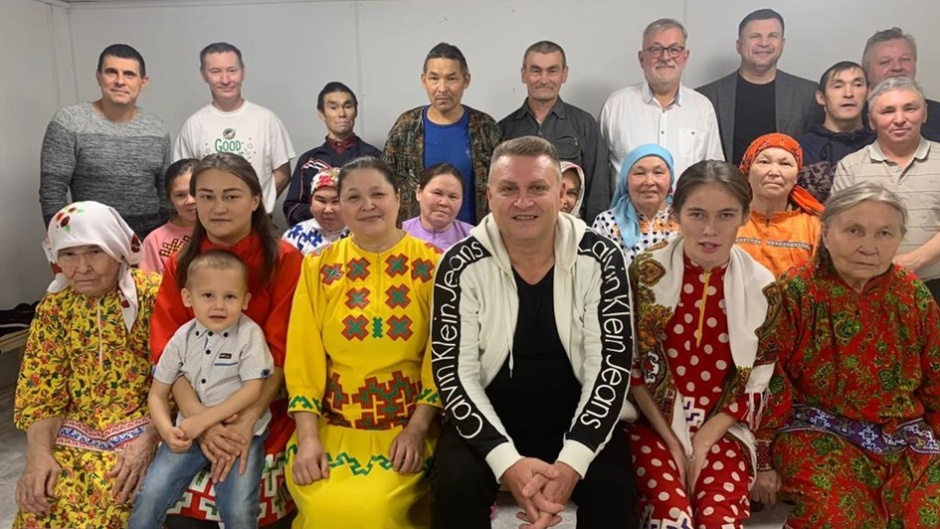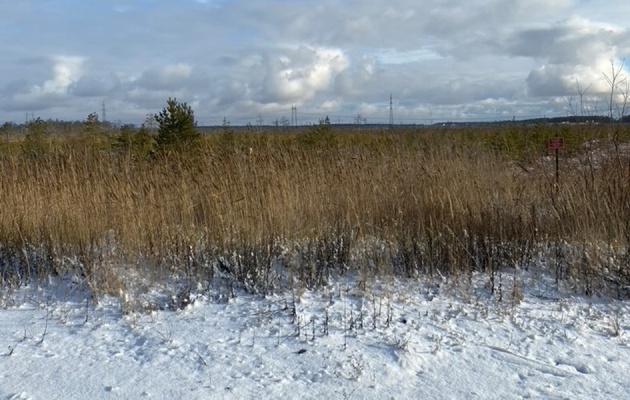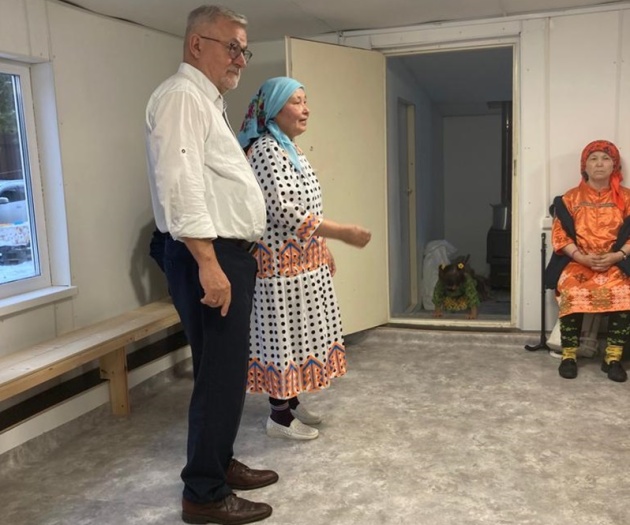Among the Khanty: Christ is also at home in the Far North
The attempt of the Russian and later Soviet state to settle them down and Christianize them, or convert them to atheism, has succeeded only to a very small extent. They still live as semi-nomads and pursue their animistic paganism.
03 NOVEMBER 2023 · 11:06 CET

In the High North of Russia
The Far North of the Russian Federation is inhabited by a number of Finno-Ugric tribes such as the Khanty, Mansi, Evenk, Nenets and others. Most of these peoples are nomadic or semi-nomadic. The attempt of the Russian and later Soviet state to settle them down and Christianize them, or convert them to atheism, has succeeded only to a very small extent. They still live as semi-nomads and pursue their animistic paganism, listen to their shamans and are haunted by spirits.
These reindeer herders, move with their huge herds through the taiga and tundra and are kept by shamans in animism with strong occult manifestations. The few attempts to missionize them have mostly failed in the past. Also the missionary journeys to the Far North organised by Christians in Russia and the West since 1992 led to little success.
The Khanty have hardly been evangelized. Even in 1988 when my book “Prayer for the Peoples of the Soviet Union” was published, there was no knowledge of any Khanty or Mansi who followed Jesus [1].

The Tundra in Surgut. I was all the more surprised by the small Khanty Christian community in the village of Russinskaya, located about 150 km east of Surgut, which I visited in October 2023. Accompanied by the leaders of the Evangelical Alliance in Russia Sergei Lavrenov (President) and Vitaly Vlassenko (General Secretary) I traveled to the region to see the other non-Russian face of Siberia. The city of Surgut is a center of the Russian oil and gas industry. There are also several evangelical churches here, but only individual representatives of the native peoples have found faith in Jesus over the years. The news of the evangelical Khanties aroused our interest and curiosity.
Most of the 28,000 Khanty people live in the Khanty-Mansi Autonomous Region in the West Siberian Plain along one of Siberia’s mightiest rivers, the Ob. They still speak their Khanty language in three dialects that strongly resemble Hungarian. Attempts to write their language have been abandoned and so these tribes are without writing. Their traditions are passed on orally. Only a few parts of the New Testament are available in oral translation on phonograms.
The village of Russinskaya is a large Khanty village established by the state. Here there is a boarding school, hospital, and also other facilities that facilitate daily life in the unreal tundra landscape with temperatures in winter below - 50 degrees and swarms of mosquitoes in summer. In the village there is a beautifully developed museum, where the history of the Khanty is vividly told.
The vast majority of Khanty people in Russinskaya live as semi-nomads from reindeer herding, hunting, fishing and gathering forest and tundra berries. However, their habitat has been under massive threat since the oil and gas industry began in 1953. Therefore, tensions have repeatedly arisen between the state and the Khanty [2].
Khanties come to faith in Jesus
The evangelization of the Khanty in Russinskaya began with the conversion of the then young Khanty woman Zoya in 1992. Like many of her countrymen and peers, she was addicted to alcohol. Her first marriage went on the rocks. And then one day she met young Christians who, together with the well-known evangelist of Russia Joseph Bondarenko, came from Riga, Latvia to the North, and also approached the Khants with the gospel. At that time, she was the only one from her tribe who responded to this call and experienced a wonderful full deliverance from her addiction.
Igor also became a reindeer herder. “Today we own 150 reindeer. We live like most Khanty people do, only without their dark religion and ubiquitous alcohol”, Igor says.
About 80 Khanties have come to faith in Jesus through the couple over the years. Forty of them have together formed the evangelical congregation, which meets regularly in a converted sauna. Zoja writes songs in their language, and Igor preaches the Word of God in Russian on Sundays while his wife translates it.
“It’s not so much our words that open people’s hearts to Jesus”, Zoja says, “but our changed lives. Like them, we also live together with our flocks, but instead of drowning our sorrows in alcohol or drugs, we pray to Jesus and he gives us new courage and friends”.
And yes, joy radiates from these first-generation Christians. Many of them traveled from their flocks especially to meet with us. It is not every day that a Christian leader from Moscow and then from Germany visits them. And so, our meeting became a celebration. The Khanty people told us about their hard life, and I preached God’s Word to them. And all this far in the tundra, in the Far North of Russia. “Jesus Christ is also at home here”, one Khanty woman told me, not without pride.
What they need most
So, there are Christians among the Finno-Ugric Khanties in northern Western Siberia. And the small community in Russinskaya is far from being the only group among them. Willingly they told us their needs and hardships without complaining. “Where God is at home, life is never hopeless”, said one of their brothers. “Pray for us that our hope may not be put to shame”. And what are the intentions that we are to move?

Johannes Reimer interpreted by Zoya, the first Khanty believer. First, we are to pray that the work of translating the Bible into their language will be resumed and completed soon. “There is nothing I would like more”, one woman told me. She had come to faith in Jesus only half a year ago, she said, and God had wonderfully delivered her from her fear and addiction. “But my Russian is very bad. I understand very little when I read the Bible in Russian. But there is nothing I would like more. After all, I need God’s Word like the air I breathe”.
Of course, the translation of the Bible into Khanty also presupposes that the work on Khanty scripture will be completed and that it will be taught to the population. The Evangelical Alliance in Russia wants to take a closer look at this matter.
Second, the church in Russinskaya is in desperate need of some kind of church building, a center where they can meet for their worship services, house the growing children’s and youth ministries, and perhaps even set up something like a small Bible school for their leaders. “Building materials are certainly the very most expensive commodity here in our north. God will have to stand by us if we are to have our own church home one day”, said Igor, the church’s Ukrainian pastor, with a spark of hope in his voice. We promised to pray for this cause.
Third, the Khanties need fellowship with their own people in other areas. The long distances make such fellowship rather impossible. I suggested something like a Khanty Christian radio. The Internet works well in this unreal world thanks to the oil industry. Of course, the whole thing would cost money again, but if the financing could be solved, then that would be a way to each other. And again, we agreed in prayer to move the cause.
Pray that the work of translating the Bible is completed. “I understand very little when I read the Bible in Russian”
Fourth, not all Khanties have the opportunity to gather as an ethnic community. As a rule, they attend Russian congregations. Only rarely do they understand how to adjust to ethnic minorities. There is a need for something like a concept of multi-ethnic congregation among the evangelicals in Russia. And here, too, the leaders of the Evangelical Alliance have recognised the challenge and want to work on the issue.
Their songs will accompany me for a long time
I was among the Christian Khanties in the West Siberian tundra. I have heard their testimonies, their singing and laughter. It is hard to forget such things. The visit to the Far North obliges me to pray.
May many more Khanties and peoples like them find their Savior in Jesus Christ. The world, thousands of kilometers away from them, is in turmoil. But they rejoice in the fact that Jesus Christ, the Savior of the world, has come to their cold north and they are experiencing freedom and blessing. And they are thankful for their missionary and pastor Igor, a Ukrainian who stayed with them, lives here, and raises reindeer with them while preaching the Gospel to them. If that is not a miracle!
Johannes Reimer, professor of Missiology and Director of the Department of Public Engagement of the World Evangelical Alliance (WEA).
Notes
1. Johannes Reimer: Gebet für die Völker der Sowjetunion: Informationen, Hintergründe, Möglichkeiten. (Stuttgart: Hänssler Verlag 1988), 148.
2. Evdokiia A. Nemysova: The Khanti of the West Siberian Plain, in: Richard B. Lee, Richard Heywood Daly (Hrsg.): The Cambridge Encyclopedia of Hunters and Gatherers. (Cambridge: Cambridge University Press, 1999), 161–165.
Published in: Evangelical Focus - Features - Among the Khanty: Christ is also at home in the Far North
